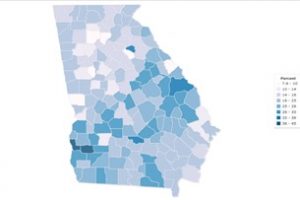By Zoe Smith
Atlanta used to be one of the top cities for young college graduates to gain employment, but in the last decade, Georgia college and university graduates are increasingly seeking jobs in other large cities such as Houston, Nashville and Denver.
Young, college graduates often seek out large, metropolitan cities for employment, areas which tend to have more jobs available and higher wages. It is no surprise that the migration of college and university-educated 25-34-year-olds to suburbia right outside of metro cities has fueled economic growth for those areas. The more talented minds a city employs, the more economic growth it receives.
Ironically, states that have high economic growth in large metropolitan cities tend to have higher poverty rates. Georgia was ranked thirteenth in percentage of population living in poverty during 2013, with 16.3% of Georgians, about 1.6 million individuals, living in poverty. While there was a 9.1 percent drop from the previous year, Georgia’s poverty rate was still above the country’s average. When looking at a poverty map of Georgia counties from 2009-2013, there is a general correlation between a county’s poverty level and the percent of persons holding a bachelor’s degree or higher: the more individuals who held a bachelor’s degree or higher, the lower the country’s poverty rate.
In a TED Talk, author J. D. Vance talks about upward mobility and the dangers of brain drain from impoverished communities. Individuals who come from low-income communities that decide to pursue higher education tend to take their newly developed skills and talents to already flourishing communities after they graduate rather than back to their communities. “Because they can’t find high-skilled work at home, [talented people] end up moving elsewhere, so they don’t build a business or non-profit where they’re from, they end up going elsewhere and taking their talents with them. There are failing schools in a lot of these communities, failing to give kids the educational leg up that really makes it possible for kids to have opportunities later in life,” said Vance in his TED Talk. This “brain drain” furthers the socioeconomic gap between communities and trying to grow economically. TED Talk
This trend can be seen in two neighboring Georgia counties: Clarke and Oconee. When looking at a map showing poverty rates among Georgia counties, Clarke County sticks out like a sore thumb. Its dark-blue coloring indicates that 33-38 percent of persons in Clarke County live below the poverty level and clashes with the white coloring of Oconee County, located directly below Clarke, which indicates that only 7.6-10 percent of the population live below the poverty level. Clarke County even contrasts with the rest of its surrounding counties which are colored light-gray to indicate that 14-18 percent of persons in those counties live below the poverty level.
Looking more closely at Clarke County and Oconee County, discrepancies can be seen in the two counties’ education systems. Oconee County has been ranked the top school district in Georgia, the top SAT average in the state of Georgia and the top 2 percent of high schools nationwide. The county also had a 74.7 percent passing rate for and has a graduation rate of 95.6 percent. Go ten miles away to a Clarke County high school, and the passing rate of AP exams drops to 39.7 percent and the graduation rate to 80.3 percent.
When looking at data from the University of Georgia’s fact books, the number of University of Georgia alumni residing in Clarke County decreased by nine percent from 2009-2013. Over those same years, University of Georgia alumni residing in Oconee County increased by almost 15 percent.
“For every college graduate who takes a job in an innovation industry…five additional jobs are eventually created in that city, such as for waiters, carpenters, doctors, architects and teachers,” according to the New York Times.
If college graduates were to take their talents and educated minds to low-income, impoverished communities where unemployment rates and poverty levels are high, such communities would benefit from newfound community partners. Such an idea may not be appealing to a young college graduate seeking the bountiful opportunities that large cities have to offer, but the long-term reward of working with a community to grow its economy and reduce its poverty may be second to none.

